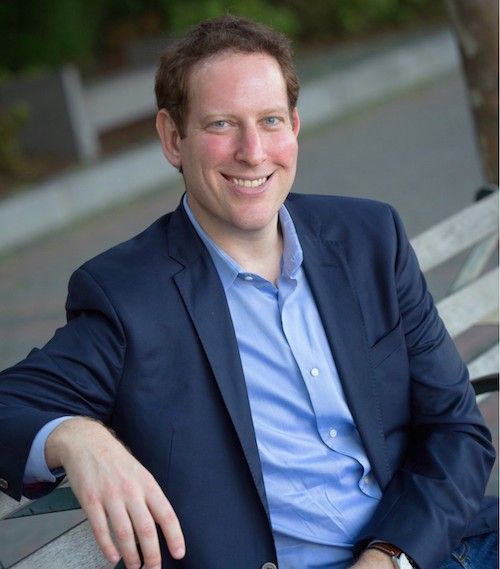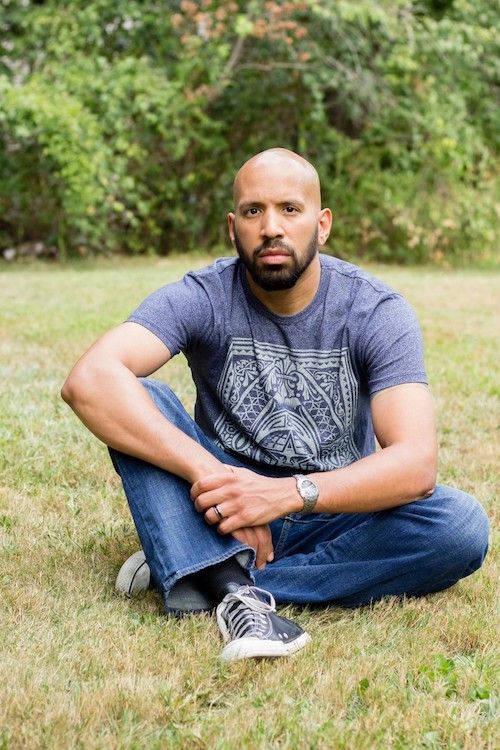
Indie Press Polis Launches Diversity-Focused Crime Imprint Agora Books
As the year closes, crime fiction readers received news of an exciting new development in the indie lit world. Jason Pinter, founder of Polis Books, along with his recently named editor, Chantelle Aimée Osman, announced a new imprint: Agora Books. Designed to seek out some of the best in crime fiction and noir, Agora will focus on diverse voices, putting out between six and ten books per year. And we got to sit down to talk to Jason, Chantelle, their initial three authors…basically every damn person involved in this exciting new indie crime fiction imprint.
Book Riot: Let’s start with just a little background info. I’m interested, I guess mainly from Jason, how this all got started.
Jason Pinter: I’ve been going to crime conventions for over a decade, both as a publishing professional and an author, and over the last few years it’s become increasingly clear that the demographics in attendance—both authors and readers—were deviating further away from being an accurate representation of our communities at large. A lot of people have been talking about the need for change. And since I run a publishing company, I was in a place to be proactive and try to make a change from within. I felt that by starting Agora, by making it clear we wanted to be progressive about the importance of diversity in the genre, we would attract some incredible talent. And this is just the tip of the iceberg.
Book Riot: I’d love to hear about how Chantelle came onboard. She is obviously (because of her experience as an editor and sort of crime fiction curator over the past decade or so) a perfect fit for this particular project. So, to Jason, what all went into the editor choice? And, to Chantelle, this seems like the kind of gig that will sort of dominate your time. So as someone who’s had a lot of irons in the fire for quite a while, what is it about this project that made you want to commit?
Jason Pinter: I’ve known Chantelle for a long time. She’s a fantastic editor, and has always struck me as someone who has her finger on the pulse of the genre and the community as a whole, and is also consistently in the trenches when it comes to taking pitches and meeting aspiring writers. She and I were on the same page about wanting to create change from within—and with Chantelle having already met several potential authors, I knew that if we combined the publishing capabilities of Polis Books with Chantelle’s publishing “street smarts,” we’d have a hell of a thing.
Chantelle Aimée Osman: This is, without a doubt, a passion project for me, and something I’ve wanted to do for a while. As an editor, I have always loved discovering new and different voices, and now, through Agora, I will be able to seek them out and make sure these voices get a place on the shelf. Additionally, the opportunity to work with someone like Jason, who has such vast experience in publishing, and Polis, whose author list is already stellar, is really an honor.
Book Riot: I want to invite each of the OG3 to give us your elevator pitch about the book we can watch for in 2019. So, John Vercher, Patricia Smith, and Tori Eldridge, in your own words, give us the capsule Tweetable summary of each of your books.
John Vercher: Three-Fifths is about a biracial Black man, passing for white, who is forced to confront the lies of his past while facing the truth of his present when his best friend, just released from prison, involves him in a hate crime.
Patricia Smith: Remember tells the story of a young girl’s journey through the death of her mother and sister while dealing with a severe case of social anxiety disorder.
Tori Eldridge: The Ninja Daughter is an action-packed thriller about a Chinese-Norwegian modern-day ninja with Joy Luck Club family issues who fights the Los Angeles Ukrainian mob, sex traffickers, and her own Hong Kong mother to save two desperate women and an innocent child from a violent land-grab scheme.
Book Riot: All three of these are debut novels. Is part of your focus seeking out some debuts, such as these, which might have been overlooked elsewhere in the crime fiction world?
Jason Pinter: Having three debuts on our inaugural list was a happy accident. There are many writers on our radar for Agora who are not, but at the same time having new authors in John, Patricia, and Tori felt somewhat karmic. We will continue to look for great new voices, but also veteran authors whose readership we could potentially expand.
Chantelle Aimée Osman: I can’t wait to share John, Patricia and Tori’s debut novels with the world next fall. And, as Jason mentioned, we have a lot of other fantastic ideas in the pipeline, some first-time, some not. Our goal is to make sure that these voices don’t get overlooked, which is a large part of why Agora, like Polis, takes un-agented submissions. There are a lot of great agents out there, but sometimes it can be difficult for some out-of-the-box voices to reach their radar.
Book Riot: To the writers…How long had you been trying to get published? At any point did you feel like issues of diversity, or lack thereof, hindered your progress in any way?
John Vercher: I’ve been fortunate in that in the grand scheme of things, I wasn’t pitching as long as you can hear it takes. Three-Fifths was my master’s thesis and I graduated in 2016. It took some years of rejections and editing to get it where it is now. One never knows if you’ve been rejected because of diversity issues, because in my experience, it’s not something they come right out and say. Having said that, Three-Fifths is very much about systemic racism, and given the makeup of the majority of publishing today, it wouldn’t surprise me if the content shone a light in places some didn’t want to see.
Patricia Smith: I started querying Remember a year ago, however, I have been trying to get published ever since I was fourteen years old. There weren’t many young black woman authors in my genre growing up, so I thought it would be cool to be one of the first and pave the way. But years and years went by, not only was I not getting attention but I didn’t see any other young black authors getting attention either. It was a hard pill to swallow, that society and the publishing world wasn’t ready for someone like me, but I refused to give up. I knew some day, someone was going to hear my voice. I am so grateful to Chantelle and Polis Books for taking that chance on me.
Tori Eldridge: My submission process was active! My agent was pitching two different novels simultaneously. So, not only was I writing the sequels to both of these novels during the wait time, I ended up rewriting both of those novels in the midst of submission. It got a little crazy, but staying busy helped reduce the natural doubts and frustrations of waiting.
Book Riot: Do you feel there has been positive momentum in the publishing world to include more writers from diverse background and different perspectives? We did see a very diverse Anthony Awards lineup at Bouchercon. I’ve written about and continue to be pleased with recent releases from indie crime publishers like Down & Out, Crooked Lane, and your own Polis Books.
Jason Pinter: I feel there is intention, but I don’t think intention is the same as momentum. I think a lot of people want to see an increase in diversity in the genre, but that’s not the same as actually taking proactive steps. Panels are predominantly white. Audiences at cons are predominantly white. Faculty at cons—agents and editors—are predominantly white. I’m not saying we’re going to overturn decades of entrenched homogeneity overnight, but if more diverse writers are being published, there will be more diverse readers and attendees, more diversity in leadership positions, and hopefully that will proliferate throughout the industry as a whole.
Chantelle Aimée Osman: I do, albeit slowly and belatedly. I can see effort being made throughout the industry— Sisters in Crime’s Publishing Summit Report on Diversity, conferences like Left Coast Crime and ThrillerFest which are prioritizing change. As an industry, we need to grow, change and evolve. This genre, at its core, is about shining a light on justice and issues in society, and we need to take that lesson off the page, too.
John Vercher: I’d like to say yes, but some of the push seems to be hyping diversity so they can say they do it. However, publishers like the ones you’ve mentioned, along with events like #DVpit, websites like Lit Agents of Color, groups like Crime Writers of Color and the like are creating a ground swell to make the industry more inclusive.
Patricia Smith: Yes, I have felt that way. I honestly think persistence and talent attribute to that because at the end of the day, no matter where you come from or what you look like, if you can write, publishers will see that. Some of us just have to fight harder to be heard.
Tori Eldridge: Absolutely. Today’s readers enjoy having their perceptions challenged. They want to explore other cultures, other societies, and unexpected commonality. And publishers like Polis Books are listening.
Book Riot: Do you feel more focus on diversity in indie (crime) lit than you do in the world of the Big 5?
Jason Pinter: I think sometimes smaller presses are more amenable to taking on authors or books that don’t fit the blockbuster mold. With houses and imprints consolidating, and less shelf and reviews space, often a major publisher won’t take on an author if they don’t think they can sell a certain number of copies. We don’t have corporate overseers nitpicking our margins. Indies like Polis and others you mentioned are nimble and can take more chances. If we read a book and like it, we can make an offer the next day.
Chantelle Aimée Osman: This is one of the major reasons I’m so happy to be working with Polis. I’ve always mourned the shift from the Perkins/Knopf publishing model, which supported authors in the long-term, to the marketing-driven model of today. A lot of that paradigm needs to shift, and hasn’t. Jason shares my view, so at Polis, not only are the authors the key component, but we have the freedom to try new and different things, and break that narrow marketing mold that it’s so hard to escape at a larger house.
Book Riot: How do you feel like the current political and social climate impacts your writing?
John Vercher: The current political climate to me is no different than it was sixty years ago. We simply have more technology and mediums with which to view the atrocities committed in this country in the name of racism. These times aren’t strange to us. It’s how it’s always been. As such, it affects everything I write, both fiction and nonfiction.
Patricia Smith: I think these strange times are what make my writing meaningful. The fact that I am a black woman writing about issues that aren’t really talked about, especially in the black community, is important. I hope my fellow debut authors and I pave the way for so many other diverse authors out there who feel like their voices don’t matter.
Tori Eldridge: With the #MeToo and #EndDomesticViolence movements, the time is right for a heroic protagonist like Lily Wong. She’s not a cartoon superhero: She’s a modern young woman putting her life on the line for her sisters.
Book Riot: What was the inspiration for your novel? Did your individual background influence you or your writing? And if so, how?
John Vercher: I was inspired by the writing of John Edgar Wideman and his “Homewood Trilogy.” When I went to college in Pittsburgh in the mid-’90s I was introduced to his work. I also love the work of Ernest Gaines, particularly A Gathering of Old Men. My individual background certainly influenced my novel. I am the son of a Black father and white mother, and had many questions circling identity as a young man and even into adulthood. A lot of that identity was formed during my time in Pittsburgh.
Patricia Smith: The inspiration for my novel, like all my writing, comes from the fact that books like mine saved my life growing up. Specifically, because they were talking about issues not many people were talking about. People tell you “write what you know.” I knew a lot about mental health. It was my truth. I dealt with depression, cutting, eating disorders, addiction—and I want to be part of the author club where you can save lives with words.
Tori Eldridge: I’m a (Hawaiian) Chinese-Norwegian fifth-degree black belt in To Shin Do Ninjutsu with Joy Luck Family issues whose lived in L.A. for thirty-five years. So, yeah…my background might have had a teensy bit of influence on The Ninja Daughter.
Book Riot: Crime fiction can take in so much: mysteries, literary crime, even cozies, noir, some borderline horror. How do you define a crime novel?
John Vercher: It’s funny, I didn’t initially see Three-Fifths as a “crime novel.” In Gaines’s A Gathering, a crime presents the inciting incident that allows us to get to know the characters involved. In that sense, it can be seen as a crime novel. I believe that since it can encompass so many aspects that maybe the crime novel shouldn’t be defined. There is such incredible writing happening in those sub-genres that it almost feels unfair to restrict them to any one category.
Patricia Smith: Technically, I would define a crime novel as all of the above, but for me, what I appreciate most about a crime novel is the psychological aspect. I want to feel uncomfortable. I want to ask myself questions. I want to reevaluate what I’ve always thought about something. I want all those things while I’m reading a crime novel. I want all those things for my readers.
Tori Eldridge: Any story that revolves around crime can be considered a crime novel: It’s just a question of emphasis and which readers you want to attract.
Book Riot:What can we expect in the future from Agora?
Jason Pinter: You can expect smart, diverse, thought-provoking, riveting crime fiction from all walks of life. We aim to showcase voices from anywhere and everywhere, in all genre permutations. You can expect to find new authors, and perhaps discover veteran authors for the first time. Chantelle and I have high expectations of Agora—and ourselves—and there’s nobody more excited to watch the next few years develop than we are.
Book Riot: And to the writers, being debut novelists, are there some places readers can go to get a little taste of your writing?
John Vercher: My fiction can be found on Akashic’s flash fiction sites, Mondays Are Murder, And FriSci-Fi. I am a contributing writer for WBUR Boston’s thoughts and opinions page, Cognoscenti, and I recently had a long-form essay published by Entropy Magazine. You can find links on my website: www.johnvercherauthor.com.
Patricia Smith: I have a blog on Tumblr that I sometimes post little excerpts of what I’m currently working on. It’s patriciashanae.tumblr.com. I also have a blog dedicated to people struggling with any type of mental health issues where they can post how they’re feeling and ask me questions. I’m not a professional by any means, but I definitely experienced a lot and can offer a lot of hope: tell-patricia.tumblr.com
Tori Eldridge: You can learn all about me on my website torieldridge.com. I have tons of free content—years of mindful living blogs and over sixty empowering podcasts—plus descriptions and buy links to my non-fiction Empowered Living: A Guide to Physical and Emotional Protection and three anthologies that contain my suspenseful short stories. You can even read “Call Me Dumpling,” the short story that inspired The Ninja Daughter.

















